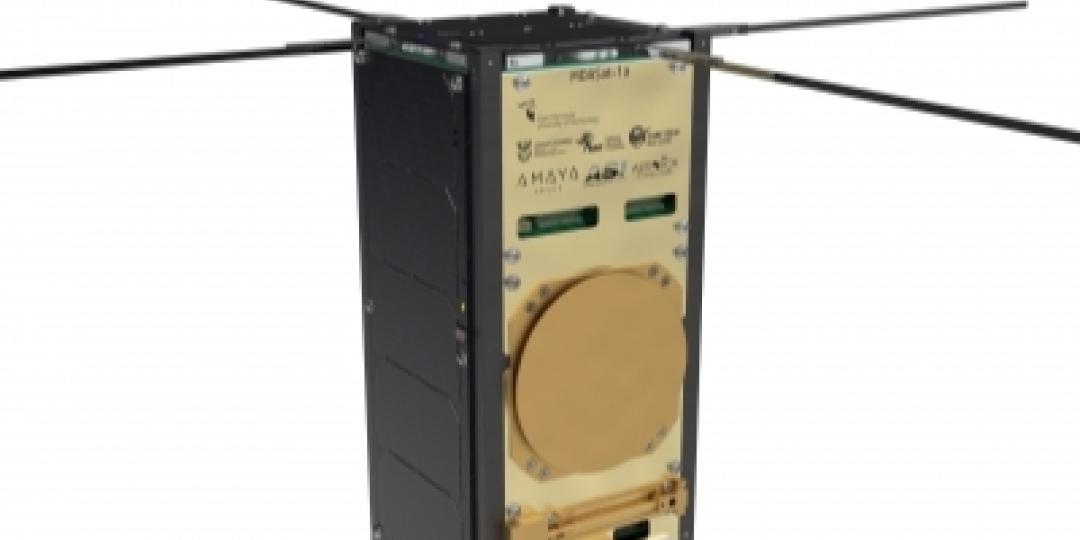Today (Thursday 13 January 2022) the Cape Peninsula University of Technology is set to launch its third satellite mission into space from the Cape Canaveral launch site in the USA consisting of three 3U CubeSats MDASat 1a, MDASat 1b and MDAsat 1C
The MDASat (Marine Domain Awareness) constellation has two main priorities namely ocean economy and healthcare and has been mandated by the Department of Science and Innovation to enhance South Africa’s ocean’s sovereignty. Operation Phakisa, a fast-track implementation of the National Development Plan, focuses on effective marine domain awareness. The Software Defined Radio payload being used in the mission aims to enhance the security and protection of South African marine resources.
MDASat is CPUT’s third satellite mission and follows on from ZACUBE-1 (TshepisoSat) and ZACUBE-2’s successful development, launch and operation. In the interim, a suite of commercial CubeSat parts have also been developed by CPUT engineers and these will also be in use on the satellites.
CPUT’s Acting Chief Engineer on the project Nyameko Royi says increased visibility in space by more nations bodes well for all.
“This mission would mark the first constellation of satellites developed and designed in Africa. The more we get people involved in space the better, the more data we extract from space- the better for the world. This is a significant milestone for CPUT and South Africa,” he says.
Dean of the Engineering and Built Environment Faculty at CPUT Prof Marshall Sheldon says the MDASat launch is the latest development in a long timeline of space engineering events at the university, which first began in 2008.
“Each successful development and launch is a paradigm shift away from the traditional space industry norms and we are proud to be at the centre of that. Attracting more undergraduate and postgraduate student to careers in space science will ensure we can continue celebrating future successes,” she says.
MDASat Specification
The first three satellites of the MDA constellation will carry an upgraded AIS receiver payload from ZACube-2 and will be capable of the following;
- Over the air upgrades which means software can be developed and uploaded to the orbiting satellite when ready.
- Raw date: The payload captures raw data and enhances the opportunity for diagnostic testing on signal interference and decoding messages.
- Long Range AIS: These are two specific channels to be used as uplinks for receiving AIS messages by satellite.
- More effective messaging scheme: The first generation payload was limited in how it could save data and have it extracted by the ground station. The enhanced data interface will optimize the use of the data transmitter’s bandwidth.
These enhancements pave the way for the future MDASat-2’s development and launch and minimises the risk of damage to the current payload.
SpaceX, the company founded by SA born entrepreneur Elon Musk, will be launching the constellation on 13 January 2022 at 17:25pm (Florida time 10:25am).The launch can be watched live using this link www.spacex.com/launches the webcast starts about 10 to 15 minutes before lift-off and ends shortly after payload deployment.
The Minister of Higher Education, Science and Innovation, Dr Blade Nzimande, is pleased to announce that the Department of Science and Innovation's (DSI's) funding and support of South Africa's satellite construction industry is reaping rewards, as the country gears up for the launch of the first three satellites of its Maritime Domain Awareness Satellite (MDASat) constellation.
The launch of the first three satellites (MDASat-1) follows three years after the launch of the most advanced South African CubeSat to date, ZACube-2, as a technology demonstrator for the MDASat constellation.
"Since its launch in 2018, ZACube-2 has been providing cutting-edge very high frequency (VHF) data exchange communication systems to the country's maritime industry, as a contribution to Operation Phakisa," Dr Nzimande said, adding that the DSI had invested R27 million over three years in the development of the MDASat constellation.
Although South Africa has been involved, on a relatively small scale, in space activities since the dawn of the space age in 1957, the national space industry requires specialised skills.
The Minister noted that the lack of space professionals and engineers had prompted the DSI and its entity, the National Research Foundation (NRF), to initiate a human capital development programme at CPUT under the French South African Institute of Technology (F'SATI) cube satellite (CubeSat) programme, with the introduction of a Master's in Electrical Engineering focusing on satellite systems.
"As part of this programme, students are taught engineering principles using CubeSats as training tools," Dr Nzimande said. "CubeSats are built using the same engineering principles as any other satellite, hence highly specialised and advanced skills are acquired through this programme."
The MDASat-1a,1b and 1c launch will be a significant milestone for South Africa, marking the first launch of a satellite constellation developed entirely on the African continent. "This will further cement South Africa's position as an African leader in small satellite development, and help the country to capture a valuable share of a niche market in the fast-growing global satellite value chain," said Dr Nzimande.
The three MDASat-1 satellites are scheduled to be launched from Cape Canaveral in the United States on Thurday, 13 January 2022 at 17:25 South African Standard Time. This is the latest estimated time, and is subject to change depending on weather conditions.















